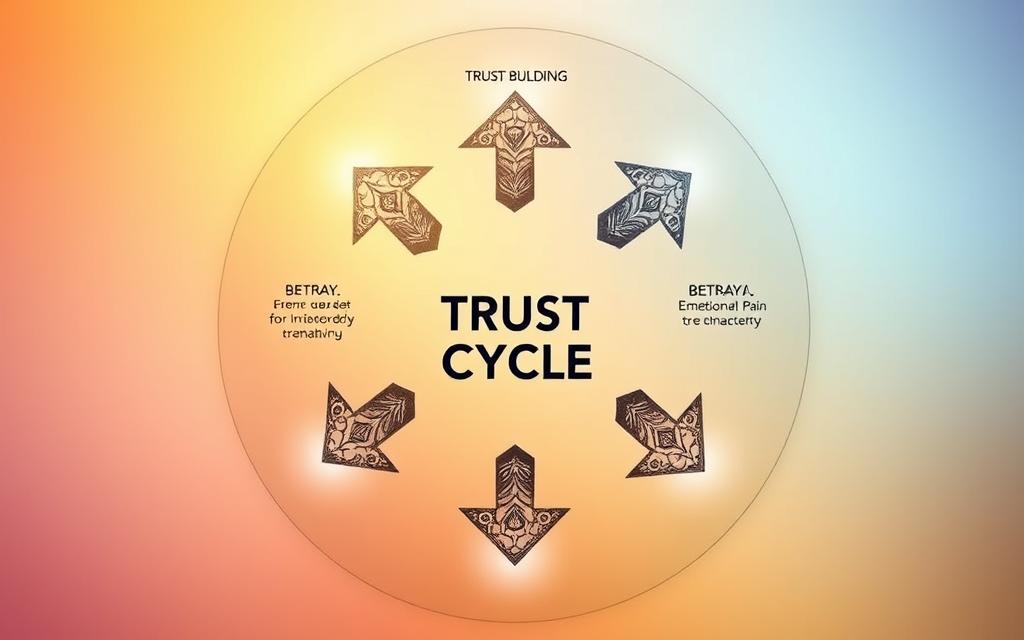Deception can leave deep scars, making us doubt ourselves and our relationships. When trust is broken, it feels like the world has changed. But, you’re not alone in this fight. With the right help, you can heal and rebuild trust.
This guide will help you through the healing process. We’ll cover how to deal with the emotional pain of betrayal. You’ll learn how to rebuild trust and grow as a person. We’ll face challenges like self-blame and anger together, helping you become stronger.
Healing isn’t easy; it’s a journey with ups and downs. But, with time, patience, and support, you can overcome. Let’s start this journey together, one step at a time.
Understanding the Impact of Deception on Mental Health
The study shows how deception affects our emotional trauma, psychological consequences, and self-identity. Betrayal and dishonesty can cause lasting harm. They can make us feel like we’re always on guard, have nightmares, and relive scary moments.
Emotional Trauma and Its Effects
Being deceived can break our trust and make us wary of others. The emotional trauma can show up in many ways. We might feel anxious, depressed, have trouble in relationships, or doubt our worth.
Psychological Consequences of Betrayal
Betrayal can shake our confidence and make us question our judgment. It can make us feel vulnerable and unsure. This can make it hard to trust others and feel secure in our interactions.
Impact on Self-Identity
Deception can also affect how we see ourselves. We might doubt our ability to make good choices and question our self-worth. This can lead to feeling let down and unsure of who we are.
It’s important to understand the effects of deception on our minds and feelings. By recognizing these impacts, we can start to heal and become stronger. We can learn to rebuild our trust and find our true self.
The Cycle of Trust and Betrayal
Rebuilding trust after betrayal is hard and takes time. The cycle of trust and betrayal can leave deep scars. But, by understanding this cycle and taking steps, it’s possible to heal from infidelity.
The trust cycle starts with being open and vulnerable. People invest their emotions in a relationship. Then, a betrayal happens, breaking the trust. This can lead to feelings of confusion, anger, fear, and self-loathing.
To rebuild trust, time, effort, and commitment are needed. It starts with acknowledging the pain and setting new boundaries. It’s a slow and hard journey, but it’s key to healing and moving forward.

Going through the cycle of trust and betrayal is not straightforward. It means revisiting the relationship and working through emotional trauma. With patience, vulnerability, and a willingness to forgive, people can find a healthier relationship.
Recognizing Signs of Emotional Manipulation
Emotional manipulation is a sneaky form of abuse that can hurt our relationships and mental health. By knowing the tricks manipulators use, we can spot the relationship red flags. This helps us break free from manipulative patterns.
Common Manipulation Tactics
Gaslighting is a common form of psychological abuse. Manipulators might deny what’s real, question your views, or make you doubt your own memories. This can lead to feeling unsure of yourself. Guilt-tripping and playing the victim are also tactics. They involve blaming others or getting sympathy to control you.
Red Flags in Relationships
Look out for constant criticism, emotional blackmail, and efforts to isolate you. These signs suggest a manipulative relationship. Manipulators aim to control and lower your self-confidence, making it hard to trust yourself.
Breaking Free from Manipulative Patterns
Spotting the signs of emotional manipulation is key to taking back control. Setting boundaries, getting professional help, and focusing on self-care can help. Remember, you deserve respect and care, not emotional manipulation.
The Role of Self-Worth in Recovery
Restoring self-worth is key to healing from betrayal. Betrayal can make us feel ashamed, guilty, and lose our self-esteem. It’s vital for those trying to move past the emotional pain of betrayal.
Betrayal can break down our trust and self-worth. It can cause emotional pain, anxiety, and depression. Therapists say it’s crucial to heal these emotional wounds to truly recover.
Recovery starts with fighting negative thoughts and being kind to oneself. This means treating yourself with kindness and understanding. Mindfulness and positive psychology can help in accepting oneself and restoring self-worth.
Having a strong support system and doing things that make you feel good is also important. Taking care of yourself, setting boundaries, and feeling in control helps rebuild confidence and strength.
The path to self-worth recovery is tough but necessary. By facing the trauma and being compassionate with oneself, people can come out stronger. They can find purpose and self-worth again.
Healing the Pain of Deception: Essential Steps
Healing from deception’s pain is a journey with many steps. The first step is to acknowledge the pain. It’s key to understand the emotional hurt caused by betrayal. Let yourself feel all emotions, from anger to sadness, without judging.
Building a strong support system is crucial. Talking to trusted friends or family helps process emotions. Joining a support group for those who’ve faced similar betrayals offers community and understanding.
Seeking professional help is also very helpful. Counseling, like couples or individual therapy, offers tools for rebuilding trust. It helps set healthy boundaries and improve communication.
Healing from deception isn’t straightforward. It may have ups and downs, but with patience and self-compassion, you can grow stronger. Stay committed to your healing journey.
Breaking the Pattern of Self-Blame
Healing from betrayal starts with overcoming self-blame. Victims often doubt themselves after being deceived. But, it’s key to remember that the blame is on the deceiver, not the victim.
Using cognitive-behavioral techniques can change negative thoughts. It helps to see things more clearly and positively. Focusing on personal growth and being kind to oneself is also vital.
- Overcoming self-blame involves recognizing that the deceiver’s actions are a reflection of their own character, not the victim’s.
- Cognitive-behavioral techniques can help reframe negative self-talk and challenge distorted thought patterns.
- Cultivating self-compassion and focusing on personal growth are crucial for breaking the cycle of self-blame.

Healing from betrayal’s emotional pain is a journey. Remember, the pain is not because of your worth or actions. By letting go of self-blame and being kind to yourself, you start healing. This is the first step towards overcoming self-blame, healing from betrayal, and emotional recovery.
Rebuilding Trust After Betrayal
Getting back trust after a betrayal is tough but doable. It takes setting clear boundaries and talking openly. Being open, consistent, and patient helps fix the broken trust in your relationship.
Setting Healthy Boundaries
Creating clear boundaries is key to healing. It means sharing what you need and want clearly. Make sure your partner respects these boundaries. Having your own space and growing apart can also help rebuild trust.
Communication Strategies
Good communication is the base for rebuilding trust. It’s about listening well, sharing your feelings without blaming, and understanding your partner. This creates a safe space for closeness and connection again.
Remember, fixing trust after a betrayal takes time. It needs patience, consistency, and teamwork. With healthy boundaries and good communication, you can overcome this tough time and strengthen your bond.
The Journey Through Grief and Anger
Coping with heartbreak and managing anger are key parts of healing after betrayal. The path through grief and anger is complex. People feel many strong emotions, like sadness, rage, and despair. It’s important to acknowledge and process these feelings for emotional healing.
It’s important to see that feeling strong emotions is normal. Betrayal can feel like a huge loss, like losing a loved one. The three stages of grief – numbness, disorganization, and reorganization – are similar. Letting yourself fully feel and process these emotions is crucial for healing.
Healthy ways to cope can help manage anger and emotional pain. Activities like journaling, exercise, and mindfulness can help. Also, getting support from friends, family, or a mental health professional is important for healing.
The journey through grief and anger is a necessary step to emotional healing. By facing and working through these complex emotions, people can start to rebuild their sense of self-worth, trust, and resilience after heartbreak.

- Recognize the normalcy of intense emotions like sadness, rage, and despair.
- Utilize healthy coping mechanisms such as journaling, physical exercise, and mindfulness practices.
- Seek support from friends, family, or a mental health professional.
- Acknowledge and work through the complex emotions to foster emotional healing.
Finding Support Systems and Resources
Recovering from betrayal is tough, but you’re not alone. Support systems are key in healing. They offer community, shared experiences, and coping strategies.
Professional Counseling Benefits
Professional counseling can change your recovery journey. A good therapist can help you deal with trauma and rebuild trust. They also teach you how to set boundaries and handle complex relationships.
Support Group Advantages
- Joining a support group makes you feel less alone. It’s a safe place to share your feelings and experiences.
- Meeting others who’ve faced similar issues can be very validating. It helps you feel understood and supported.
- Support groups create a community. You learn from others and find strength in shared experiences.
You don’t have to face betrayal alone. Use support systems and counseling to heal. It’s a journey of care and compassion.
Strategies for Emotional Recovery
Dealing with the emotional shock of betrayal can be tough. But, there are ways to heal. Practicing self-care, mindfulness, and stress-reduction techniques can help a lot. Doing things that make you happy and fulfilled can also help you feel whole again.
Being resilient is key when facing betrayal. Positive self-talk and reframing negative experiences can help you move forward. Having a strong support system, like friends, family, or counselors, can give you the strength you need.

Betrayal can have serious psychological effects, similar to PTSD. Symptoms like anxiety, depression, and hypervigilance can occur. Getting professional help, like therapy, is a big step towards healing. It offers tools and support to deal with the emotional aftermath.
Methods like cognitive-behavioral therapy (CBT) and trauma-focused therapy can really help. They tackle negative thoughts and unhealthy coping habits. By facing the pain, building a support network, and using healing strategies, you can turn betrayal into growth and strength.
The Power of Forgiveness in Healing
Forgiveness is key in healing. It helps us move past resentment and pain. By forgiving ourselves and others, we start a journey of growth and peace.
Self-Forgiveness Techniques
Starting to forgive yourself means being kind to yourself. Acknowledge your past hurts and try to understand them. This lets you heal and move forward.
- Engage in self-reflection to identify the root causes of your feelings.
- Write a letter to yourself, expressing forgiveness and compassion.
- Surround yourself with supportive individuals who can offer encouragement and validation.
Moving Beyond Resentment
Getting over resentment is a big step. It’s okay to feel hurt, but choose forgiveness over anger. This choice helps you find peace and well-being.
- Acknowledge the pain and anger you feel, but don’t let it consume you.
- Shift your perspective by considering the humanity in the person who has wronged you.
- Engage in activities that bring you joy and a sense of purpose to help you move forward.
Forgiveness is a journey, not a finish line. It takes time and patience. By forgiving, we open the door to healing and inner peace.
Rebuilding Personal Relationships
Fixing personal relationships after a lie is hard but very important. It takes time, effort, and honest talks. The journey to rebuilding relationships, trust-building, and relationship recovery means setting new goals and rebuilding closeness.
First, we must face the hurt caused by the lie. Betrayal can hurt a lot, and it’s key to acknowledge these feelings. Trust-building is like a dance, and both sides must take small steps to rebuild trust.
- Open communication is key. Partners should share their needs, fears, and hopes openly and without fear of judgment.
- Setting clear boundaries and expectations helps create a safe and secure feeling in the relationship.
- Being consistent and open is vital for rebuilding relationships and earning back trust.
Patience is essential on this journey, as relationship recovery takes time. It may take a while for both to feel safe and secure again. Getting help from a therapist or counselor can be very helpful.

In the end, fixing relationships after a lie needs a big commitment from both. By focusing on open talks, setting good boundaries, and giving trust time to grow, couples can build a stronger bond.
Creating Healthy Boundaries Moving Forward
Setting up and keeping healthy boundaries is key to healing after betrayal. It means clearly telling others what you expect and respecting their space. This helps keep your emotions safe and builds respect, vital for a strong partnership.
Setting Clear Expectations
Creating healthy boundaries starts with setting clear expectations with those around you. Talk openly about what you need and what you won’t tolerate. This clear communication builds respect and prevents future problems.
Maintaining Personal Space
It’s also crucial to maintain personal space in your relationships. Respect each person’s privacy and need for alone time. This way, you build trust and understanding, key for healthy relationships.
Healthy boundaries are not about controlling others. They’re about keeping your emotional health safe. By setting and keeping these boundaries, you’re healing and moving forward with confidence.
Transforming Pain into Personal Growth
Deception can leave us feeling lost and hurt. But, we can turn that pain into a chance for growth. By seeing betrayal as a chance to grow, we can become stronger and wiser.
The journey to grow after betrayal is tough but shows our strength. Through looking inward, we find new strengths like valuing ourselves more and setting clear boundaries. We also learn to bounce back from hard times.
Remember, healing doesn’t mean ignoring the pain. It’s about taking back control and changing our story for the better. This might mean getting help, taking care of ourselves, or finding new hobbies that make us happy.
Growth is a journey with ups and downs. But with each step, we get stronger and more ready for life’s challenges. By going through this, we not only heal but also become more real, powerful, and happy.
Developing New Trust Perspectives
Rebuilding trust after betrayal is tough. It means changing how we see relationships and trust. Creating new trust views is key to healing and building better connections.
Trust isn’t just yes or no. It’s built slowly over time. Seeing trust this way helps us be more balanced in our relationships. We avoid being too trusting or too skeptical.
It’s also important to see vulnerability as a strength. Being open and honest, even after being hurt, helps build trust. It takes courage and a desire to grow.
Developing new trust views is about finding a middle ground. It’s about trusting ourselves and knowing when to be cautious. We learn to spot signs of trouble and choose relationships that are truly caring.
This path to trust is hard, but it’s crucial for healing and forming lasting bonds. By adopting these new views, we can overcome the hurt of betrayal. We become more trusting, resilient, and connected.
Conclusion
Healing from deception in a relationship is tough, but it’s doable. You can move on and find better connections. Understanding the hurt, finding ways to cope, and growing personally helps you regain trust and self-worth.
To rebuild trust, talk openly, be patient, and work together. Set clear limits, get help if you need it, and forgive. Celebrate small wins and see your progress to stay on the right path.
Choosing to leave a deceitful relationship might be the best for your emotional health. Getting help from therapists or counselors can guide you. They help you focus on self-care and healing in the long run.
